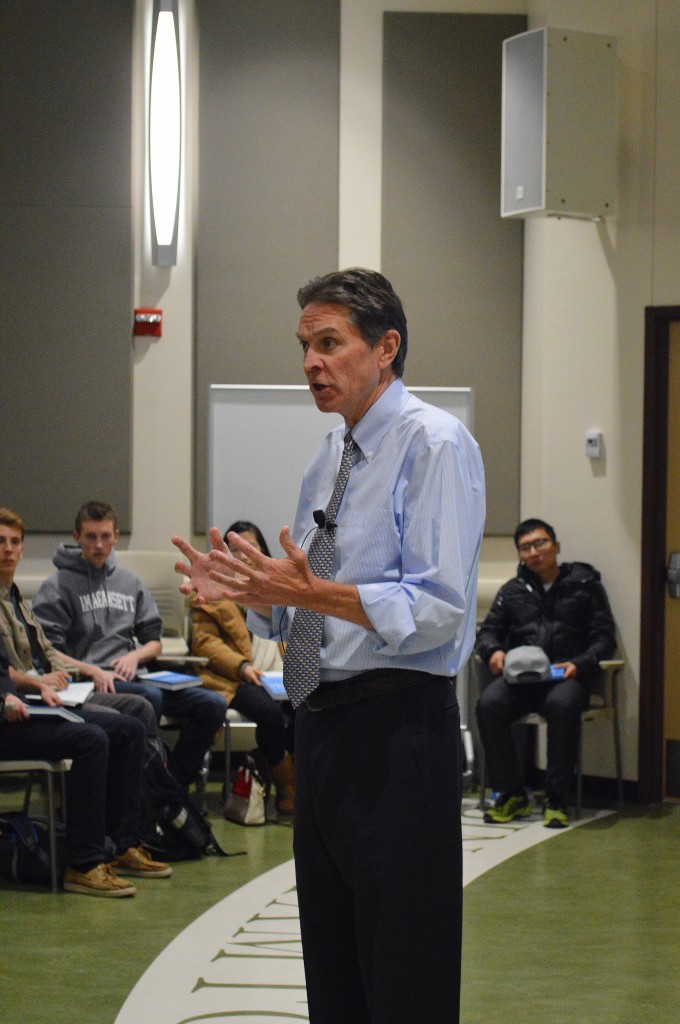
Ben Carpenter may be a successful businessman now, but he wasn’t always. In fact, it took several years before he understood how to make the most of his career. With over 20 years of experience on Wall Street, he’s working to prepare students to become successful in their careers right out of school.
As part of his tour promoting his book “The Bigs,” Carpenter came to the Binghamton University Admissions Center on Wednesday to discuss his ideas with 100 attendees.
According to Carpenter, he realized students should start preparing for the competitive world during school when he saw that his daughter, a recent college graduate, was unprepared for the demands of a post-college career.
He explained that in order for students to be ready, they must be able to recognize their talents and find careers that utilize their strengths. Carpenter said traditional academics do not give students enough experience to find their strengths, a process which, according to him, begins with understanding how companies operate and discovering whether or not that particular career is a good fit.
“You just got to look in the mirror,” Carpenter said. “If you really sit down, look inside yourself, ask yourself ‘What is it that I enjoy doing?’ … I think you’ll have an idea that can lead you to an industry or job.”
He also advocated for knowing what exactly a career or job entails before pursuing it, which he said he learned the hard way. At his first job at Greenwich Capital, he was one of the worst traders.
“[Students] have to understand as much as possible about the industry, company or job that they are looking at,” Carpenter said. “They have to be introspective about how they can help the company succeed.”
Once students are sure of the career they would like to pursue, they must be able to demonstrate during interviews that they will be a valuable addition to the company.
“That takes a level of preparation, aggressiveness, salesmanship and confidence that only a small number of students have,” Carpenter said.
Job searching will undoubtedly bring some rejection, but Carpenter encourages students to remain resilient. Attending informational sessions to practice for job interviews can help students to bounce back, he claims, and can help them to establish contacts within their networks.
“You’ve got to keep going until you accomplish your goal,” Carpenter said. “There’s no turning back, there’s no safety net, there’s no alternative. You’ve just got to keep going.”
Graduates should not remain complacent, either. Even on their first day of working in the real world, graduates should establish themselves as leaders and think in terms extending beyond their job description, Carpenter said.
“Get to work early, ask good questions and look for ways to help other employees do the job. If you do that consistently you will be identified as a leader,” Carpenter said.
Carpenter also stressed that students should explore different positions within the company rather than remain focused on a specific job. Nicole Paulino, a senior majoring in English, will find Carpenter’s advice and book very helpful as she attends informational interviews with employers over winter break.
“I’ll enter in a lot more confident and, especially after I read the book, I’ll be able to understand what I need to do in order to show myself fully to an employer during an interview,” Paulino said.
Maureen Mullarkey, a senior majoring in English, said she enjoyed the talk since it focused on gaining meaningful experience rather than just having a high GPA.
“We’re so focused, especially our generation, on grades and academics that we don’t necessarily realize what we want to do and we don’t get as much experience as we should,” Mullarkey said.
According to Justin Ong, a junior majoring in management, the most helpful piece of advice for him was to remain open-minded when pursuing a career.
“Even if you’re sure you know what you want to do, that doesn’t mean that’s it, that’s the end of it,” Ong said. “It’s really important to keep learning and keep looking.”


